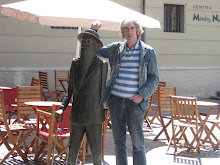Santiago Bernárdez, a designer from Cangas de Morrezo, has started selling Galician kilts. Although Santiago lived in Scotland for five years, the idea occured to him while attending the Ortigueira Celtic Music Festival on the northern coast of Galicia.
He designed a tartan, signed up with the Tartan World Register (at a cost of €400) and called a Scottish friend to order thirty kilts. They sold quickly. He has now ordered another hundred, which are on the market for €27.99 each. The kilt is a combination of cobalt blue and navy blue with a touch of white.
Galicia is not the first foreign land to register its own tartan by any means. The likes of Germany, The Netherlands and Australia already have their own.
http://www.galicianshop.com/
Info from Galician supplement in El País, 30th July, 2008.
Wednesday, July 30, 2008
Tuesday, July 15, 2008
The Lusophone Commonwealth
The Xunta will have to come to an agreement with the Spanish central government in order to obtain permission to become an associate observer of the Comunidade dos Países de Língua Portuguesa (CPLP), whose full members are the Portuguese speaking countries of Brazil, Angola, Mozambique, Cape Verde, Guinea-Bissau, São Tomé and Príncipe, East Timor and Portugal itself.
CPLP Executive Secretary, Luis Fonseca, has advised Galicia to request permission from Madrid to join as the CPLP does not want get embroiled in diplomatic conflicts with central governments.
He pointed out that the body is made up of countries and not regions, so Galicia could only hope to become an associate observer like the former Portuguese colonies of Goa (India), Macao (China) and Malay (Malaysia).
Fonseca added that if Galicia applied through the Spanish central government it would have every chance of gaining the statute thanks to its shared values and similarities with the Portuguese and Lusophone culture.
CPLP Executive Secretary, Luis Fonseca, has advised Galicia to request permission from Madrid to join as the CPLP does not want get embroiled in diplomatic conflicts with central governments.
He pointed out that the body is made up of countries and not regions, so Galicia could only hope to become an associate observer like the former Portuguese colonies of Goa (India), Macao (China) and Malay (Malaysia).
Fonseca added that if Galicia applied through the Spanish central government it would have every chance of gaining the statute thanks to its shared values and similarities with the Portuguese and Lusophone culture.
Subscribe to:
Comments (Atom)
